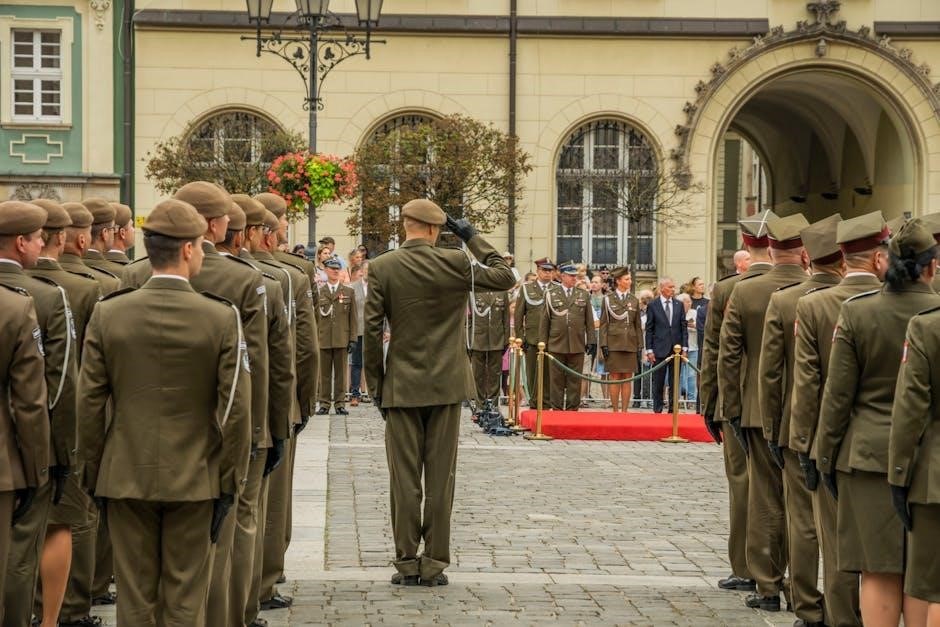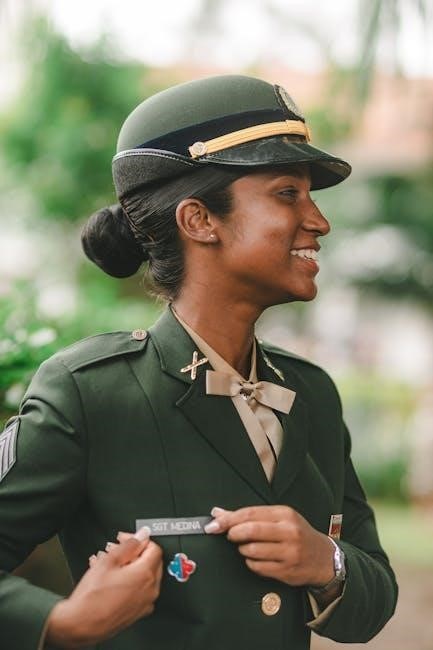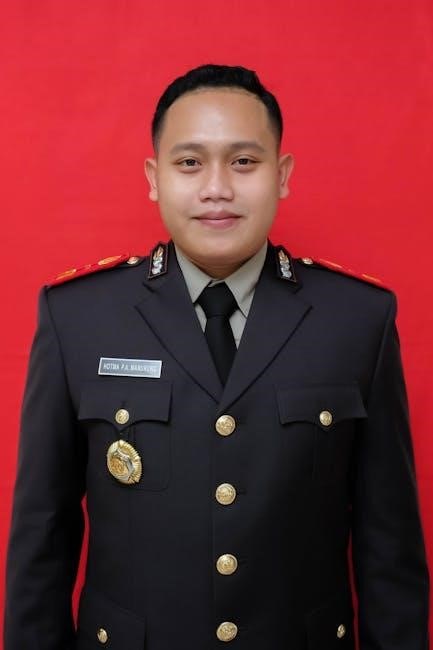The Army NCO Guide serves as a foundational resource for noncommissioned officers‚ providing essential insights into leadership‚ supervision‚ and the care of soldiers‚ ensuring their success and effectiveness.
1.1 Overview of the NCO Guide
The Army NCO Guide is a comprehensive manual designed to equip noncommissioned officers with the knowledge and skills necessary to lead effectively. It covers essential duties‚ responsibilities‚ and leadership principles‚ ensuring NCOs can mentor‚ supervise‚ and care for soldiers. The guide emphasizes professionalism‚ decision-making‚ and communication‚ aligning with the Army’s strategic goals. Recent updates include shifts to virtual learning and enhanced professional development guidelines‚ reflecting the evolving needs of modern NCOs. It remains a vital resource for fostering excellence in the NCO Corps.
1.2 Importance of the NCO Role in the Army
The NCO role is the backbone of the Army‚ ensuring unit cohesion and mission success. NCOs are responsible for leading‚ mentoring‚ and caring for soldiers‚ making them indispensable in both garrison and combat environments. Their leadership directly impacts morale‚ discipline‚ and readiness. As primary trainers and developers of soldiers‚ NCOs bridge the gap between officers and enlisted personnel‚ fostering professionalism and accountability. Their role is critical in maintaining the Army’s effectiveness and achieving strategic objectives‚ making them the cornerstone of the force.
Roles and Responsibilities of Army NCOs
Noncommissioned officers are entrusted with leading‚ mentoring‚ and caring for soldiers‚ ensuring mission accomplishment and unit readiness. Their responsibilities include training‚ supervising‚ and developing subordinates to achieve organizational goals.
2.1 Leadership and Supervision
The foundation of an NCO’s role‚ leadership and supervision are critical in guiding soldiers toward mission success. NCOs lead by example‚ fostering a culture of discipline and accountability. They are responsible for training‚ mentoring‚ and evaluating their teams to ensure readiness. Effective supervision ensures tasks are executed efficiently‚ while leadership inspires soldiers to achieve excellence. Strong leadership and supervision are essential for maintaining unit cohesion and achieving strategic goals.
2.2 Mentorship and Counseling
Mentorship and counseling are vital roles for NCOs‚ fostering personal and professional growth among soldiers. NCOs guide soldiers in achieving career goals‚ improving performance‚ and overcoming challenges. Effective counseling addresses both positive feedback and areas for improvement‚ ensuring soldiers are prepared for future responsibilities. Mentorship builds trust and confidence‚ while counseling provides structured support‚ helping soldiers navigate their military journey successfully. These efforts strengthen individual and unit performance‚ aligning with the Army’s mission and values.
2.3 Care and Feeding of Soldiers
The “care and feeding” of soldiers is a cornerstone of an NCO’s responsibility‚ ensuring their well-being and readiness. This includes monitoring health‚ morale‚ and welfare‚ while addressing personal and professional challenges. NCOs provide guidance on resources such as counseling services‚ financial planning‚ and career development. They also foster a positive unit environment‚ encouraging teamwork and resilience. By prioritizing soldiers’ needs‚ NCOs build trust and strengthen unit cohesion‚ enabling soldiers to perform at their best.

Leadership Competencies for NCOs
Leadership competencies for NCOs include decision-making‚ problem-solving‚ and communication skills‚ essential for inspiring and guiding soldiers. These skills enable NCOs to lead effectively and adapt to challenges.
3.1 The NCO Creed and Its Significance
The NCO Creed is a foundational document that outlines the responsibilities‚ values‚ and leadership principles of noncommissioned officers. It serves as a moral and ethical guide‚ emphasizing the NCO’s commitment to soldiers‚ mission‚ and the Army’s traditions. By internalizing the Creed‚ NCOs are inspired to lead by example‚ fostering unit cohesion and discipline. Its significance lies in its ability to shape the mindset and actions of NCOs‚ ensuring they remain dedicated to excellence and the welfare of their soldiers.
3.2 Decision-Making and Problem-Solving
Effective decision-making and problem-solving are critical competencies for NCOs‚ enabling them to navigate complex operational environments. The Army NCO Guide emphasizes the importance of critical thinking and structured approaches to address challenges. NCOs are trained to analyze situations‚ evaluate options‚ and implement solutions that align with mission objectives. These skills are honed through experience‚ mentorship‚ and professional development‚ ensuring NCOs can make informed‚ timely decisions that support unit success and soldier welfare. Strong problem-solving abilities enhance leadership credibility and contribute to mission accomplishment.
3.3 Communication Skills
Effective communication skills are vital for NCOs to lead and inspire soldiers. Clear and concise verbal and written communication fosters trust and ensures mission execution. Active listening and adaptability in communication strategies are essential for building strong team cohesion and addressing individual needs. The Army NCO Guide highlights these competencies as fundamental to successful leadership and unit effectiveness.
Professional Development for NCOs
Professional development for NCOs is crucial for their growth and effectiveness. The Army NCO Guide provides a framework for continuous learning‚ ensuring NCOs remain adaptable and relevant in a changing military environment.
4.1 NCO Education System (NCOES)
The NCO Education System (NCOES) is a structured program designed to enhance leadership skills and tactical expertise among noncommissioned officers. It includes courses such as the Primary Leadership Development Course and the Advanced Leadership Course‚ which focus on developing problem-solving techniques and decision-making abilities. NCOES ensures that soldiers are prepared for increasingly complex responsibilities‚ aligning with the Army’s strategy to build a resilient and adaptive NCO Corps. The system emphasizes continuous learning and professional growth.
4.2 Promotion Process and Requirements
The promotion process for Army NCOs is designed to ensure only the most qualified and capable leaders advance. Requirements include completing professional military education‚ meeting performance benchmarks‚ and demonstrating leadership potential. Recent updates emphasize the importance of mentorship and counseling in preparing soldiers for higher ranks. The process involves evaluation boards‚ performance reviews‚ and adherence to established criteria to maintain the integrity and effectiveness of the NCO Corps‚ ensuring leaders are ready to meet evolving Army needs.
4.3 Professional Military Education (PME)
Professional Military Education (PME) is a cornerstone of NCO development‚ equipping leaders with advanced knowledge and skills. The Army offers structured PME programs‚ such as the Primary Leadership Development Course (PLDC) and Advanced Leadership Course (ALC)‚ designed to enhance leadership‚ tactical expertise‚ and decision-making abilities. These programs align with the Army’s strategic goals‚ ensuring NCOs are prepared to lead effectively in complex operational environments. PME is essential for fostering a resilient and adaptive NCO Corps capable of meeting future challenges.
The NCO Strategy and Its Impact
The NCO Strategy drives the evolution of the NCO Corps‚ ensuring it remains relevant and aligned with Army goals. It focuses on developing adaptive leaders capable of meeting future challenges effectively.
5.1 Evolution of the NCO Corps
The NCO Corps has historically served as the backbone of the Army‚ with its roles expanding over time to meet evolving military needs. From leading soldiers in combat to managing complex operations‚ NCOs have adapted to maintain operational excellence. Recent updates‚ such as the shift to virtual learning and revised promotion guidelines‚ reflect the Corps’ commitment to modernization. These changes ensure NCOs remain capable of addressing future challenges while upholding their legacy as the Army’s most trusted leaders.
5.2 Aligning NCO Development with Army Strategy
The development of NCOs is carefully aligned with the Army’s strategic goals to ensure they are prepared to meet current and future challenges. This alignment focuses on enhancing leadership competencies‚ decision-making‚ and communication skills to support operational success. By integrating professional military education (PME) and the NCO Education System (NCOES)‚ the Army ensures NCOs are equipped to lead effectively. Recent updates‚ such as virtual learning and revised promotion guidelines‚ further strengthen this alignment‚ ensuring NCOs remain central to achieving the Army’s mission.
5.3 Building a Resilient and Adaptive NCO Corps
Building a resilient and adaptive NCO Corps is essential for meeting the Army’s evolving challenges. The NCO Guide emphasizes fostering mental agility‚ character‚ and adaptability to thrive in dynamic environments. By prioritizing mentorship and training‚ NCOs are equipped to lead with flexibility and resilience. This approach ensures they can navigate uncertainty‚ inspire confidence‚ and maintain mission readiness. A resilient corps is the backbone of the Army’s ability to adapt and succeed in modern warfare and global security operations.

NCO Guide Updates and Revisions
The Army NCO Guide has undergone recent updates to reflect modern leadership challenges‚ including shifts to virtual learning and strengthened promotion linkages‚ ensuring NCOs remain effective leaders.
6.1 Recent Changes in NCO Policies
Recent updates to the Army NCO Guide include shifts to virtual learning in NCO academies and strengthened promotion linkages tied to professional military education. These changes aim to modernize NCO development‚ ensuring leaders are better prepared for future challenges. Additionally‚ new guidelines for contracting NCOs and updated evaluation systems reflect the Army’s commitment to enhancing leadership capabilities and maintaining a resilient NCO Corps.
6.2 Shift to Virtual Learning in NCO Academies
The Army has introduced virtual learning platforms for NCO academies to modernize training and enhance accessibility. This shift allows NCOs to complete professional development remotely‚ reducing the need for in-person attendance. Virtual modules cover leadership‚ mentorship‚ and technical skills‚ ensuring consistency and flexibility. This approach aligns with the Army’s goal of creating a more adaptable and resilient NCO Corps‚ preparing leaders for evolving challenges while maintaining high standards of excellence.
6.3 Strengthening NCO Promotion Linkages
The Army has strengthened promotion linkages by tying advancements to the completion of professional military education (PME) and other developmental milestones. This ensures NCOs are better prepared for higher ranks and responsibilities. The revised guidelines emphasize merit-based promotions‚ fostering a culture of excellence and accountability. By aligning promotions with education and performance‚ the Army aims to build a more competent and resilient NCO Corps‚ capable of leading in complex operational environments while maintaining the highest standards of professionalism.
Tools and Resources for NCO Success
The Army NCO Guide provides essential resources‚ including FM 7-22.7‚ online platforms‚ and specialized tools‚ to enhance leadership and professional development for NCOs.
7.1 Army NCO Tools and Applications
The Army NCO Tools and Applications are designed to enhance leadership and operational efficiency. These resources include digital platforms‚ leadership guides‚ and training apps that provide NCOs with standardized procedures and best practices. Tools like the Army NCO Tools app offer practical resources for mentorship‚ training‚ and soldier development. These applications ensure NCOs are well-equipped to lead‚ train‚ and care for their soldiers effectively‚ fostering a culture of excellence and continuous improvement within the Army.
7.2 FM 7-22.7: The Noncommissioned Officer Guide
FM 7-22.7 is a critical resource for Army NCOs‚ serving as a comprehensive guide for leadership‚ mentorship‚ and soldier care. It replaces the outdated Training Circular 22-6‚ offering updated practices and standards. This manual provides detailed insights into the roles and responsibilities of NCOs‚ emphasizing their importance in maintaining unit cohesion and effectiveness. It is a foundational document that aligns with the Army’s strategy to modernize NCO development and ensure their continued relevance in a changing military landscape.
7.3 Online Platforms for NCO Development
The Army has embraced digital transformation by introducing online platforms to enhance NCO development. Platforms like the Army Learning Management System (ALMS) and Joint Knowledge Online (JKO) offer virtual training modules‚ career advancement resources‚ and access to professional military education. These tools enable NCOs to pursue continuous learning and stay updated on the latest leadership strategies. Additionally‚ online communities and forums‚ such as the NCO Guide website‚ foster collaboration and knowledge-sharing among NCOs worldwide‚ promoting a culture of excellence and adaptability in the modern military environment.

Historical Perspective of NCOs in the Army
The NCO Corps has historically been the backbone of the Army‚ with its roots tracing back to the earliest days of the military. NCOs have consistently played a pivotal role in shaping the Army’s structure‚ discipline‚ and leadership‚ making them indispensable to its success and legacy.
8.1 The Backbone of the Army: NCO History
The history of Army NCOs traces back to the earliest days of the military‚ with NCOs serving as the foundation of unit cohesion and discipline. From the Revolutionary War to modern conflicts‚ NCOs have consistently demonstrated leadership‚ expertise‚ and dedication. Their roles evolved over time‚ adapting to changing military needs‚ but their core responsibility of leading and caring for soldiers has remained constant. Notable NCOs have left lasting legacies‚ shaping the Army’s identity and operational success.
8.2 Notable NCOs and Their Contributions
Notable NCOs have left an indelible mark on the Army’s history through their exceptional leadership‚ valor‚ and dedication. For instance‚ CSM Gary Littrell‚ a Medal of Honor recipient‚ exemplified courage during the Vietnam War‚ inspiring countless soldiers. Other NCOs‚ like SFC Randall Shugart and MSG Gary Gordon‚ demonstrated ultimate sacrifice in Somalia‚ earning the Medal of Honor posthumously. These individuals‚ among many others‚ have set the standard for NCO excellence‚ shaping the Army’s legacy and motivating future leaders to emulate their example.
8.3 Evolution of NCO Roles Over Time
The role of NCOs has evolved significantly over time‚ adapting to the Army’s changing needs. Historically‚ NCOs focused on basic leadership and discipline‚ but modern NCOs are expected to be well-rounded leaders‚ mentors‚ and problem-solvers. Advances in technology and warfare have expanded their responsibilities‚ requiring greater expertise in strategic planning and adaptive leadership. The NCO Guide reflects these changes‚ emphasizing the importance of professional development and continuous learning to meet contemporary challenges effectively.

NCO Contracting Officer Guidelines
The Army NCO Contracting Officer Guidelines outline professional development and acquisition roles for NCOs‚ ensuring they excel in Army contracting and acquisition processes with updated policies and training.
9.1 Professional Development for Contracting NCOs
Professional development for contracting NCOs involves specialized training and certification programs tailored to enhance their expertise in Army acquisition processes. These programs ensure NCOs are well-versed in contracting principles‚ legal requirements‚ and ethical standards. Mentorship initiatives pair experienced NCOs with junior personnel to foster practical learning and leadership growth. Continuous education aligns with the Army’s acquisition strategy‚ ensuring NCOs remain proficient in managing complex procurement operations and delivering critical capabilities to the force.
9.2 Roles in Army Contracting and Acquisitions
NCOs in Army contracting and acquisitions play a critical role in procurement processes‚ ensuring compliance with regulations and efficient resource management. They collaborate with officers to develop contracts‚ negotiate terms‚ and oversee execution. NCOs also serve as advisors‚ providing expertise on budgeting‚ vendor relations‚ and acquisition strategies. Their role ensures the Army receives quality goods and services‚ supporting operational readiness and mission success while maintaining ethical standards and accountability in all transactions.
9.3 New Guidelines for NCO Contracting Specialists
New guidelines for NCO contracting specialists emphasize enhanced professional development and ethical standards. These updates ensure NCOs are proficient in procurement processes‚ contract management‚ and compliance. The revised policies focus on improving transparency‚ reducing errors‚ and aligning contracting practices with modern Army operations. Additionally‚ the guidelines highlight the importance of leveraging technology and digital tools to streamline acquisitions. These changes aim to equip NCOs with the skills needed to support the Army’s modernization goals effectively.
The Army NCO Guide is essential for fostering leadership and excellence‚ ensuring NCOs are prepared to lead effectively and uphold the Army’s mission with integrity and professionalism.
10.1 The Future of the NCO Corps
The future of the NCO Corps lies in modernization and adaptability‚ with a focus on virtual learning and streamlined promotion processes to enhance leadership development. The Army is prioritizing resilience and innovation‚ ensuring NCOs remain the backbone of the force. By aligning NCO development with Army strategy‚ the Corps will continue to evolve‚ fostering leaders capable of meeting future challenges. This strategic approach ensures NCOs remain integral to the Army’s mission‚ guiding soldiers with excellence and upholding the highest standards of professionalism.
10.2 Final Thoughts on NCO Excellence
The foundation of the Army’s success lies in the excellence of its NCO Corps. NCOs exemplify leadership‚ mentorship‚ and professionalism‚ fostering a culture of resilience and accountability. Their dedication to developing soldiers and upholding Army values ensures mission accomplishment. As the backbone of the Army‚ NCOs inspire greatness‚ leading by example and embodying the principles of the NCO Creed. Their unwavering commitment to excellence is vital to the Army’s enduring legacy and its ability to overcome future challenges.